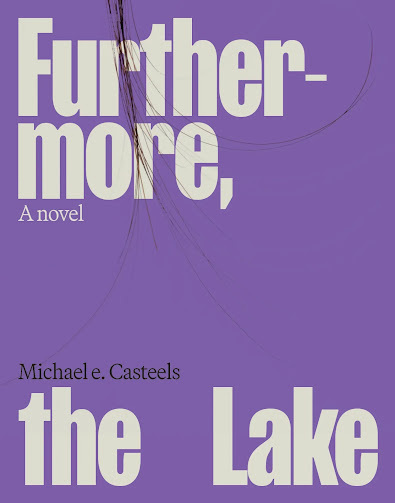Michael e. Casteels, Furthermore, the Lake
The further I walked, thecloser I got. To what, I wasn’t sure, but my feet kept moving, carrying therest of me along with them. They had their own preconceived destination—somewherethey might finally settle down, a little slice of heaven, a place to call home.I was just their solitary witness, a quiet companion, the documenter of theirlong journey.
It was easy. They walked;I followed.
The path snaked along thelakeside. The sky was a dark canvas the stars punched small holes into one byone. A sickle moon crept up from behind the horizon. A large bird beat itsenormous wings, faded into distance. Somewhere a duck quacked, then hushed, andthe relative silence resumed.
A few soft waves lappedagainst the shore with a steady rhythm. The small stones cascading across oneanother clattered out a soft melody. It was a lullaby, though I wasn’t sure whowas being lulled: me, the city, or the lake itself.
The lake sighed. I sighed.
The city drifted off intothe night, far above the lake and me.
 Thelatest from Kingston poet, editor and publisher Michael e. Casteels is thedebut novel,
Furthermore, the Lake
(Toronto ON: Guernica Editions, 2025),published as part of editor Stuart Ross’ 1366Books. Following a handful of chapbooksof poetry, prose and visuals, as well as his full-length collection,
TheLast White House at the End of the Row of White Houses
(Picton ON:Invisible Publishing, 2016) [see my review of such here], Casteels’ Furthermore,the Lake is composed as a novel of accumulated scenes that shimmer andripple, contradict and evolve, across shifting narratives. “A night can dragits feet when it wants to,” he writes, early on, “and that night it wanted to. Theoccasional car. An infrequent passerby. But when the late hours finally shiftedinto the early hours, even these ceased. The street lights shone down onnothing but cracks in the pavement.” Casteels’ narrator might be reliable but thescenes they participate in and witness seem to contradict, offering anuncertain view. His prose is composed across short bursts and flash sections comparableto the flash fictions of writers such as Lydia Davis [see my review of one of her most recent here] or Kathy Fish [see my review of her latest here], but onethat works a larger shape, although one not necessarily formed across any kindof easy or obvious concrete narrative. One has to pay close attention to detail,even across such lovely passages. And yet, the narrative does progress, momentsthat build upon moments, a thread within the swirl and field of further seemingly-contradictoryelements.
Thelatest from Kingston poet, editor and publisher Michael e. Casteels is thedebut novel,
Furthermore, the Lake
(Toronto ON: Guernica Editions, 2025),published as part of editor Stuart Ross’ 1366Books. Following a handful of chapbooksof poetry, prose and visuals, as well as his full-length collection,
TheLast White House at the End of the Row of White Houses
(Picton ON:Invisible Publishing, 2016) [see my review of such here], Casteels’ Furthermore,the Lake is composed as a novel of accumulated scenes that shimmer andripple, contradict and evolve, across shifting narratives. “A night can dragits feet when it wants to,” he writes, early on, “and that night it wanted to. Theoccasional car. An infrequent passerby. But when the late hours finally shiftedinto the early hours, even these ceased. The street lights shone down onnothing but cracks in the pavement.” Casteels’ narrator might be reliable but thescenes they participate in and witness seem to contradict, offering anuncertain view. His prose is composed across short bursts and flash sections comparableto the flash fictions of writers such as Lydia Davis [see my review of one of her most recent here] or Kathy Fish [see my review of her latest here], but onethat works a larger shape, although one not necessarily formed across any kindof easy or obvious concrete narrative. One has to pay close attention to detail,even across such lovely passages. And yet, the narrative does progress, momentsthat build upon moments, a thread within the swirl and field of further seemingly-contradictoryelements.Last but not least, youboarded the train and sat down in a window seat. You looked out at the stationplatform and smiled. Even from this distance your eyes were tiny lakes thatmirrored whatever they saw, and what they saw was me, standing on a shoreline,waving goodbye while you drifted away in your red canoe. Waves drawing you furtherand further. I didn’t expect to take a second look, but I did: your train longgone for years.
Casteels’prose has an ease to it, a compelling tone that floats across pages, amid numerousmemorable lines and prose-blocks. “The bathtub is surprisingly agile for itsage. You’d think it would lumber like a hippopotamus,” he writes, “but it’smore like a rhinoceros charging blindgly into the night. I’m a few hundredmetres behind it and losing ground. The bathtub leaps over a white picketfence, rounds a corner, and then it’s gone.” There is something of his shiftingnarrative reminiscent of Canadian playwright and mathematician John Mighton’splay Possible Worlds (1990; a film adaptation was released in 2000),holding a shifting not of perception but of action, of what is actually beingperceived. The unsettling of this foundation is purposeful and beautifully done,and does progress towards an understood meaning, one that rocks a foundation ofloss, grief and ultimate through-line, although one that doesn’t unfold orreveal as much as finally allow, all centred around, somehow, this particularimage of the lake. “The lake remembers a seagull,” he writes, “but it’s nowhereto be seen. It remembers loons, but they’re gone too. No, wait. I just heardone. A heart-wrenched wail. No response.” As he continues:
This could have beenyears ago. Or sometime last week. Or three days from now. It’s the type ofthing that happens again and again, and once started, can’t be stopped. A strandof hair stuck to your cheek. I brushed it away. It’s the only thing that keeps mefrom wandering off course. It’s what passes through my mind every time I squirta little toothpaste on my toothbrush.



